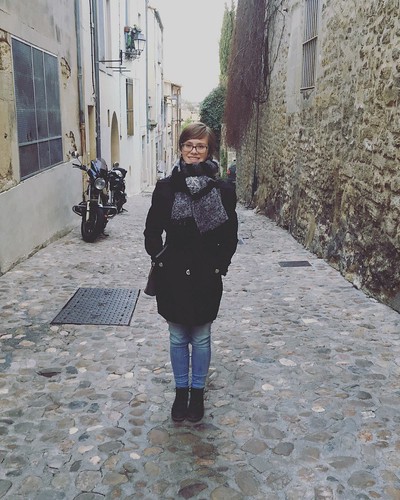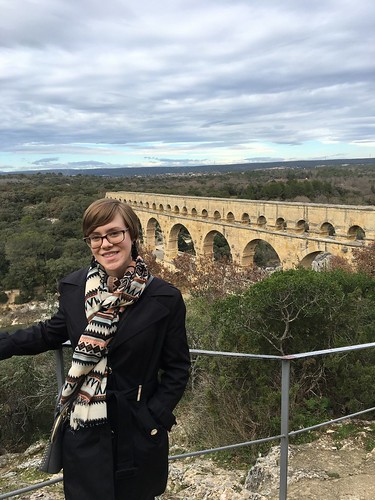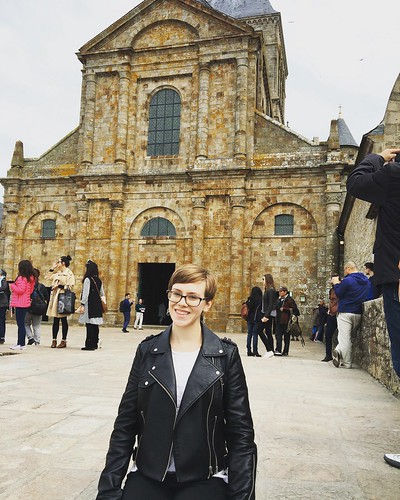Erika graduated from the University of Pittsburgh in 2016 with a Bachelor of Arts in French and Political Science (with a World Politics focus) and a certificate in African Studies. As an undergraduate, she spent a semester abroad in Rabat, Morocco and Dakar, Senegal, taking courses in French and Colloquial Moroccan Arabic, which sparked her passion for education abroad. She recently finished a contract as an English Language Assistant in Créteil, France, and is looking to apply this experience in a new position related to education abroad.

What motivated your decision to teach abroad? How/why did you choose where to go?
I have wanted to teach English abroad since I was in high school, when I realized that it would be a chance for me to share my language and culture while immersing myself in another culture. I chose France because I had studied the French language for years and, while I studied for a summer in Morocco and have travelled to Senegal, I had never spent much time in the country where this language that I knew so much about had originated.
How did you find your job? What resources did you use?
I applied and was accepted to the Teaching Assistant Program in France, which is part of a larger language assistant program sponsored by the French Ministry of National Education meant to bring native speakers of living languages to French schools as a cultural and linguistic resource for students who may not otherwise have a chance to practice with people outside of their school.
Upon my acceptance, I was given a general region and a level (in my case, secondary school), and was later matched with a high school in the suburbs of Paris based on the school’s needs and my personal preferences. Most non-European citizens teaching English in the E.U. find their jobs through programs such as TAPIF in France, North American Language and Culture Assistants in Spain, or the Fulbright English Teaching Assistant program in almost any other country.

What was your experience like? Can you share some favorite memories - and challenges?
I had an overall extremely positive experience, with colleagues and school administrators who were supportive and welcoming. Many students, no matter their level of English, would give a friendly “Hello! How are you?” in the hallways and outside of the school.
In my program, speaking French with students (or letting on about how high my level of French really is) was discouraged, so speaking almost exclusively English to students with lower levels often proved to be a challenge, as I would often have to figure out ways to rephrase if I explained something and realized that I was looking at a roomful of blank stares.
My favorite memories are all the unplanned moments that happen with students. I taught in a community with a lot of immigrants, so in addition to a French-American cultural exchange, I would also learn about Algerian, Congolese, Malian, Portuguese, Russian (and so on...) cultures, in addition to how these groups fit into French society from the perspective of my students.
What skills did you develop from your experience? Do you feel changed from your teaching experience abroad?
In the classroom, I developed a heightened sense of creativity and resourcefulness. As an assistant, I was not teaching from a textbook or pre-made worksheets but instead had to create my own lessons that were engaging and memorable, and, most importantly, made students practice their English. For example, as a lesson related to Black History Month, I gave a lesson on the Black Lives Matter movement and its context to highlight the contributions of African-Americans to social change and social justice in the United States, which the students were then able to tie into current events in France such as the Théo Affair (which occurred in a commune not too far away). Another skill that I developed was the ability to communicate with students no matter their level of English, which again, often involved creativity and improvisation.
Has your experience helped you get to where you are today? If so, how?
My experience has certainly influenced the direction in which I want my career to go, and how I want to impact my world by giving other people the opportunity to study, work, and travel in different countries in order to be more aware of their own cultural perspectives and biases.
Any advice for teachers thinking about working overseas? What are some highlights or things that you gained or changed your perspective?
The biggest piece of advice I can give is to be flexible and adaptable! Things will not always go the way you expect, as different cultures have different perspectives toward time and organization, but that doesn’t mean you should get frustrated. It all depends on the country of course, but one thing in France that took some time to adjust to was a sense of formality in the workplace - thinking about the administrative staff, most a decade or two my senior, referring to me as Madame Kotroba (while I had students calling me by my first name) still makes me laugh. It was not this formal with everyone in my school, however - I intend to stay in touch with several colleagues who I befriended along the way. I have never met anyone who has regretted working abroad, so I would advise anyone to take the chance to do it.

How has international education impacted or influenced your cultural identity?
Often being the only American in the room has made me much more aware of my own culture. There are many aspects of French culture (as well as Moroccan and Senegalese cultures from my time studying abroad) that I strongly identify with and feel I have a personal relationship with, but the culture most ingrained in my personality is American. I’ve been forced to really think about things I’ve always just accepted without question when asked questions such as “but why do you believe that big rat predicts the weather?”, and I’ve had to hide my sense of scandal when at lunch on my last day, a colleague pulled out a bottle of hard cider for everyone to share. But I’ve learned to appreciate the confusion, as well as keep the cultures that I have been a part of as a part of myself.
Is there anything else you'd like to share with us?
Once again, I fully recommend taking the chance to study, work, or live abroad when you get it. Don’t let fear keep you from a unique opportunity!
#TeachAbroadBecause … you get to share your culture while immersing yourself in another!
Stasia Lopez is the Global Education Editor for Wandering Educators and is also a Career Consultant at the University of Pittsburgh. She graduated with her Master’s degree in Educational Leadership in Higher Education and Student Affairs from Western Michigan University and earned her Bachelor of Science in Business Administration degree in Hospitality and Tourism Management from Robert Morris University. Stasia is passionate about international education, travel, and loves working on a college campus. She’s lived in four different U.S. states (Florida, Michigan, South Carolina, and Pennsylvania) and also studied and lived abroad in Rome, Italy. Stasia lives in the Pittsburgh area with her husband, Fernando, precious daughter, Maya, and playful kitty-cat Zorro.
All photos courtesy and copyright Erika Kotroba
